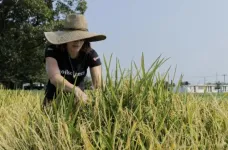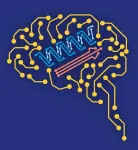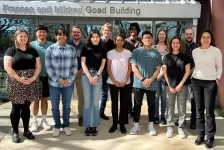(Press-News.org) After the treatment, one patient saw her first star. Another saw snowflakes for the first time. Other patients were newly able to navigate outside of the home or to read the labels on their child’s Halloween candy.
The cause of these seemingly miraculous improvements? A gene therapy developed by University of Florida scientists, which restored useful vision to most patients with the rare, inherited blindness known as Leber congenital amaurosis type I, or LCA1, in a small trial.
Those who received the highest dose of the gene therapy saw up to a 10,000-fold improvement in their light sensitivity, were able to read more lines on an eye chart, and improved in their ability to navigate a standardized maze. For many patients, it was akin to finally turning on dim lights after trying to navigate their homes in the pitch black for years, the researchers said.
The trial also tested the safety profile of the treatment. Side effects were largely limited to minor surgical complications. The gene therapy itself caused mild inflammation that was treated with steroids.
“This is the first time that anyone with LCA1 has ever been treated, and we showed a very clean safety profile, and we also showed efficacy. These results pave the way for advancing the therapy in a phase 3 clinical trial and eventually commercializing it,” said Shannon Boye, Ph.D., chief of the Division of Cellular and Molecular Therapy at UF, co-author of the study and co-founder of Atsena Therapeutics, the UF spinoff that developed the gene therapy and funded the study.
“Atsena is pleased to advance the foundational work that Shannon and Sanford Boye developed in their laboratory many years ago and thrilled that the 12-month data from our ongoing clinical trial have been published in a prestigious medical journal,” said Kenji Fujita, M.D., chief medical officer of Atsena Therapeutics and co-author of the study. “We look forward to sharing further results from this program as we continue progressing what has the potential to be a breakthrough in treating blindness in children and adults with LCA1.”
Shannon Boye, UF professor of pediatrics and Sanford Boye, associate scientist of pediatrics, and their collaborators at the University of Pennsylvania and Oregon Health and Science University published the results of the clinical trial Sept. 5 in the journal The Lancet.
LCA1 is rare. Only about 3,000 people have the condition across both Europe and the U.S. It is caused by having two defective copies of the gene GUCY2D, which is required for the light-sensitive cells in the eyes to function properly. People with the disease tend to have severely impaired vision that makes it difficult or impossible to drive, read, or navigate the world visually.
Shannon Boye has been developing the gene therapy targeting LCA1 for more than 20 years, since she enrolled as a graduate student at UF in 2001. In collaboration with her husband Sanford Boye, Shannon Boye’s lab developed the virus-based transport system that is essential for delivering functioning copies of the GUCY2D gene into the correct cells in the eyes. The Boyes founded Atsena Therapeutics in 2019 to bring the LCA1 treatment and other gene therapies to market.
“Most pharmaceutical companies are not interested in treating these rare diseases, because they are not strong revenue generators,” Sanford Boye said. “But we think these patients deserve attention, because we have treatments that work and provide really meaningful improvements to their quality of life.”
The study enrolled 15 subjects for treatment at the University of Pennsylvania or Oregon Health and Science University. Subjects received one of three different doses of the therapy to identify the safest and most effective dose for future trials. All patients received the treatment in one eye, which involved a surgical injection in the retina.
Researchers followed the patients for a year to test their vision in the treated eye compared to the untreated eye. Subjects who received higher doses saw greater improvements in their vision.
The researchers expect the gene therapy to last indefinitely, requiring just a single treatment per eye. So far, they have seen visual improvements last at least five years.
Broad access to the treatment will require approval by the FDA following a phase 3 clinical trial, which tests the therapy in a larger population of patients.
END
Gene therapy restores vision in first-ever trial for rare, inherited blindness
Patients born with a certain genetic blindness experienced the world in an entirely new way after a single treatment with gene therapy developed at UF.
2024-09-06
ELSE PRESS RELEASES FROM THIS DATE:
FAMU-FSU College of Engineering researchers examine how drought and water volume affect nutrients in Apalachicola River
2024-09-06
Near the Florida-Georgia border, the Chattahoochee and Flint rivers meet and become the Apalachicola River, which carries freshwater and nutrients downstream to the Apalachicola Bay.
New research led by FAMU-FSU College of Engineering Assistant Professor Ebrahim Ahmadisharaf examined how drought and water volume in the Lower Apalachicola River watershed affect nitrogen and phosphorous, crucial nutrients for a healthy aquatic ecosystem. The study was published in Water Research.
“In watershed systems like this, that are subject to regulations upstream, knowing how the ecosystem reacts to changes helps us manage it effectively,” said Ahmadisharaf, ...
Making baby food safer
2024-09-06
Rice and spinach are staples for babies’ and young children’s diets, but toxic metals and metalloids found in those foods can cause severe health impacts.
In particular, heavy metals such as cadmium, lead, mercury, and metalloid arsenic could delay brain development in babies and young children.
In new research published in the academic journal Environmental Geochemistry and Health, University of Delaware scientists have found that flooded rice fields tend to contain higher amounts of arsenic and lower amounts of cadmium. The drier those rice fields are, the lower the amounts of arsenic and the higher the amounts of cadmium. However, the higher cadmium is lower ...
Saline nasal drops reduce the duration of the common cold in young children by two days
2024-09-06
Using hypertonic saline nasal drops can reduce the length of the common cold in children by two days, according to a study that will be presented at the European Respiratory Society (ERS) Congress in Vienna, Austria [1]. They can also reduce the onward transmission of colds to family members.
The results of the ELVIS-Kids randomised controlled trial were presented by Professor Steve Cunningham from Child Life and Health, University of Edinburgh, UK.
He said: “Children have up to 10 to 12 upper respiratory tract infections, what we refer to as colds, per year, which ...
New RSV vaccine for older adults can result in individual and societal cost savings, benefits
2024-09-05
Vaccination against respiratory syncytial virus for adults over 60 is likely cost-effective by preventing illness, hospitalizations, lost quality of life and deaths, according to new research.
The study conducted by researchers at the University of Michigan and the U.S. Centers for Disease Control and Prevention and published in the journal Vaccine, evaluated newly approved RSV vaccines: Arexvy, manufactured by GSK, and Abrysvo, manufactured by Pfizer. The study did not include a third approved vaccine, Moderna's mRESVIA.
The vaccines are now available to adults 60 and older. The CDC recommends a single ...
Research news from the Ecological Society of America
2024-09-05
The Ecological Society of America (ESA) presents a roundup of seven research articles recently published across its esteemed journals. Widely recognized for fostering innovation and advancing ecological knowledge, ESA’s journals consistently feature illuminating and impactful studies. This compilation of papers explores the impact of rising temperatures on pathogens, dynamics of predatory seabirds and their penguin prey in Antarctica, factors determining the speed of coral reef recovery from disturbance and more.
From Ecology:
Some pathogens can’t ...
AI unlocks new path to personalized cancer treatments
2024-09-05
Researchers at Auburn University, in collaboration with scientists from the University of Basel and ETH Zurich, have made a groundbreaking advance in the fight against cancer. The team, led by Dr. Rafael Bernardi, Associate Professor of Biophysics in the Department of Physics, has developed a novel approach integrating artificial intelligence (AI) with molecular dynamics simulations and network analysis to enhance the prediction of binding sites on the PD-L1 protein. This breakthrough promises to accelerate the development ...
ResearchGate and Mary Ann Liebert, Inc. announce journal home partnership for open access journals
2024-09-05
ResearchGate, the professional network for researchers, and Mary Ann Liebert, Inc., a global media company dedicated to creating, curating, and delivering impactful peer-reviewed research and authoritative content services, are pleased to announce a new partnership through ResearchGate’s innovative Journal Home offering.
The partnership covers five Mary Ann Liebert, Inc. open access journals spanning the health and medical sciences. All backfile content and all new articles published with ...
Center for BrainHealth investigates the relationship between cannabis use, sleep and memory
2024-09-05
Dallas, September 5, 2024 – The growing legal use of recreational and medical cannabis has generated an increased concern for potential side effects from long-term use, particularly regarding problems with memory and sleep. Until now, the effect of cannabis use on sleep and on memory have only been studied separately. Research led by Francesca Filbey, PhD, from the Laboratory of Neuroimaging of Reward Dynamics at The University of Texas at Dallas’ Center for BrainHealth®, in collaboration with a team from the University of Amsterdam, aimed to fill this gap by testing how sleep impacts memory among cannabis users.
The study, “The ...
K-State researchers determine molecular interactions in plants
2024-09-05
Plant scientists have long known that phosphorus is a crucial component in plant growth. A major discovery by a K-State biologist and her lab is leading to a better understanding of how plants detect and use that resource — potentially leading to more efficient production of crops for food, fiber and fuel.
A team of researchers led by Kathrin Schrick, associate professor of biology, recently published this research in New Phytologist, a high-impact journal in the plant sciences.
Schrick's lab focused on a specific transcription factor that regulates gene expression during development. They discovered a new kind of molecular interaction between the ...
Study estimates home blood pressure devices don’t fit properly for more than 17 million US adults
2024-09-05
Over-the-counter blood pressure measuring devices offer a simple, affordable way for people to track hypertension at home, but the standard arm-size ranges for these devices won’t appropriately fit millions of U.S. consumers, according to a new study from researchers at the Johns Hopkins Bloomberg School of Public Health.
The researchers compared standard arm cuff size ranges for popular retail automatic blood pressure measuring devices to arm circumference data from U.S. government-sponsored national ...
LAST 30 PRESS RELEASES:
A kaleidoscope of cosmic collisions: the new catalogue of gravitational signals from LIGO, Virgo and KAGRA
New catalog more than doubles the number of gravitational-wave detections made by LIGO, Virgo, and KAGRA observatories
Antifibrotic drug shows promise for premature ovarian insufficiency
Altered copper metabolism is a crucial factor in inflammatory bone diseases
Real-time imaging of microplastics in the body improves understanding of health risks
Reconstructing the world’s ant diversity in 3D
UMD entomologist helps bring the world’s ant diversity to life in 3D imagery
ESA’s Mars orbiters watch solar superstorm hit the Red Planet
The secret lives of catalysts: How microscopic networks power reactions
Molecular ‘catapult’ fires electrons at the limits of physics
Researcher finds evidence supporting sucrose can help manage painful procedures in infants
New study identifies key factors supporting indigenous well-being
Bureaucracy Index 2026: Business sector hit hardest
ECMWF’s portable global forecasting model OpenIFS now available for all
Yale study challenges notion that aging means decline, finds many older adults improve over time
Korean researchers enable early detection of brain disorders with a single drop of saliva!
Swipe right, but safer
Duke-NUS scientists identify more effective way to detect poultry viruses in live markets
Low-intensity treadmill exercise preconditioning mitigates post-stroke injury in mouse models
How moss helped solve a grave-robbing mystery
How much sleep do teens get? Six-seven hours.
Patients regain weight rapidly after stopping weight loss drugs – but still keep off a quarter of weight lost
GLP-1 diabetes drugs linked to reduced risk of addiction and substance-related death
Councils face industry legal threats for campaigns warning against wood burning stoves
GLP-1 medications get at the heart of addiction: study
Global trauma study highlights shared learning as interest in whole blood resurges
Almost a third of Gen Z men agree a wife should obey her husband
Trapping light on thermal photodetectors shatters speed records
New review highlights the future of tubular solid oxide fuel cells for clean energy systems
Pig farm ammonia pollution may indirectly accelerate climate warming, new study finds
[Press-News.org] Gene therapy restores vision in first-ever trial for rare, inherited blindnessPatients born with a certain genetic blindness experienced the world in an entirely new way after a single treatment with gene therapy developed at UF.




